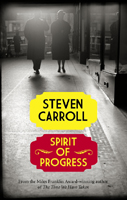 |
Spirit of Progress Steven Carroll HarperCollins 2011 |
[This novel has been longlisted for the 2012 Miles Franklin Award.]
From the publisher's page:
A sleek high-speed train glides silently through the French countryside, bearing Michael, an Australian writer, and his travelling world of memory and speculation. Melbourne, 1946, calls to him: the pressure cooker of the city during World War II has produced a small creative miracle, and at this pivotal moment the lives of his newly married parents, a group of restless artists, a proud old woman with a tent for a home, a journalist, a gallery owner, a farmer and a factory developer irrevocably intersect. And all the while the Spirit of Progress, the locomotive of the new age, roars through their lives like time′s arrow, pointing to the future and the post-war world only some of them will enter.
Reviews
Geordie Williamson in "The Australian": "Steven Carroll's novel, a prequel to the fictional trilogy for which he is best known and justly admired, endorses the Nabokovian project in all sorts of ways. Spirit of Progress holds to a languid pace at odds with the famous Victorian express train of its title, slowing time 'til it thickens to a concentrate of thought and event...Likewise, the book's narrative voice is passed on from generation to generation, person to person, building a communal portrait from singular selves...hose who have read earlier titles in Carroll's Glenroy series will recognise his method. Tales of ordinary heartbreak, told in a gentle and melancholy register; lives viewed from past, present and future perspectives in a godlike 360-degree pan. All of it taking place in a world over which history, in the guise of progress and modernity, keeps breaking like a wave...Yet the author's inveterately poetic and philosophical prose sheds an ennobling light on this shifting Australian existence. It softens rough edges, untangles human confusions, lends eloquence to otherwise inarticulate women and men...Indeed, in so lovingly and obsessively chronicling one suburb in an emerging metropolis over four novels Carroll has done for Melbourne's post-war fringes what John Updike did for urban Pennsylvania in his Rabbit tetralogy: transmute the grey facts of daily life into light and luminous art."
Jo Case for "Readings": "Spirit of Progress is a wonderfully Melbourne book, with a rich cast of characters. It's a prequel to Steven Carroll's much-loved Glenroy trilogy, featuring engine driver Vic, wife Rita and son Michael, catching the family poised on the brink of entering the world of these books: Rita is pregnant with Michael, and the novel ends with them visiting the wooden frame that will become their family home, in a suburb in the process of being born...This novel, divided into short chapters and replete with crisp, evocative imagery, is an easy but deeply satisfying read. It cannily transports the reader to the streets, cafes, galleries and workers' cottages of 1960s Melbourne - and engrosses us in the fate of Carroll's beautifully drawn characters...Highly recommended."
Andrew Reimer in "The Sydney Morning Herald": "Burnt Norton, the first of T.S. Eliot's Four Quartets, inspired and gave shape to Steven Carroll's The Lost Life, a lucid and elegant fable of unfulfilled love. Poetry still courses through Carroll's imagination. One of the characters in his new novel is a real estate developer called Webster. As Webster pores over the map of a subdivision of land near Melbourne, his still absorption is compared to Caesar's in front of his maps and to Michelangelo's in the Sistine Chapel - ''inert, inspiration having travelled to him from the stars''...These echoes of W.B. Yeats's Long-Legged Fly reveal significant aspects of Carroll's imagination and ambitions. He is a writer steeped in the traditions of European high culture and philosophical (or at least ethical) speculation. His methods are fundamentally analytical - he probes his characters' inner lives, projecting them against mundane, sometimes banal, reality. Poetry and a sense of history give shape and substance to such banalities. So the kitchen sink (the title of one of the chapters), where one of the characters stands, ''is the still point around which it all turns'' - recalling again the rarefied world of Burnt Norton...The focus of Spirit of Progress is not poetry, however, but a painting, Sidney Nolan's striking Woman and Tent, first exhibited in Melbourne in 1946. The main portion of Carroll's novel occupies three days in July of that year."
Clive Tilsley in "Bookseller+Publisher" magazine: "Reading Spirit of Progress was one of the most enjoyable things I have done for a long time. I picked it up immediately after finishing Graham Swift's new novel Wish You Were Here and it felt good to move from a grey, foot-and-mouth-diseased Britain to a bright, openedspaced Australia. It took me back to my primary-school days when we would watch films about the construction of a new and exciting Australia. The films were black and white and may have been made around the time that this book is set...I am sure everyone who has read the 'Glenroy' series will welcome this addition. If Graham Greene can have the phrase 'Greene-land' used to celebrate his fictional world, I hope Steven Carroll gets recognition for the Australia he records. Perhaps it should be called 'Carroll-land'."
Interviews
Tim Elliott in "The Sydney Morning Herald".
ABC Radio National's "Book Show".
Jo Case for "Readings".
Blanche Clark in "The Herald-Sun".
Other
The author gave a talk at Abbey's Bookshop in Sydney:
